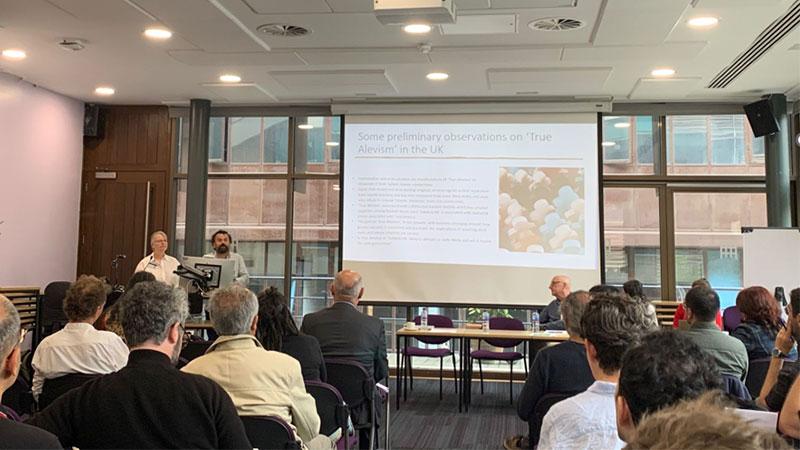Described as a landmark in Alevism Studies, researchers working with Alevis and Alevism enjoyed intense debates at the first three-day Biennial International Conference for Alevism Studies taking place between 5-7 July at the University of Westminster. The conference showcased Dr Umit Cetin and Dr Celia Jenkins’ collaboration to teach Alevism in religious education classes in schools, with Alevi children present to talk about their own schools’ Alevism lessons.

The Alevi people are a religious minority from Turkey. Within the current global political climate in the Middle East, the position of Alevis and Alevism is being redefined both by the Alevis themselves and external agents such as religious bodies and nation-states. These recent changes have brought new questions into the research agenda, such as the relationship between Alevis and other minoritised religious groups in the Middle East and the significance of Alevi people moving across the globe.
Opening the conference, Professor Dibyesh Anand, Head of the School of Social Sciences, expressed the importance of Alevism Studies as an emerging area of scholarship.
Next, the event included panels on Alevi spaces and localities, Alevi poetry, Alevi women and the politics of gender, Alevi memories and remembering, Alevi denial and resistance, law and politics. Each panel showed the long tradition of Alevi scholarship and gave researchers the chance to engage in meaningful debates and gain constructive feedback from specialists in the field. This was especially useful for PhD and MA students presenting their research as well as Westminster’s own Alevi undergraduates, who were able to discuss how to develop their research ideas.
The conference gave academics ideas about potential new directions for research and activism opportunities moving forward. One professor from Turkey described the conference as the best moment of her academic career, as it was a unique opportunity to share knowledge and expertise with other scholars on Alevis and Alevism.
Alevi children attended the panel about the introduction of Alevism lessons in UK schools, which gave them a space to ask questions and talk about their religion. The children, who were aged 9-11, came from the first school to teach Alevism lessons and said they felt proud to be Alevi at their school. One of the children asked the delegates about their experiences growing up in Turkey. In response, several described having to hide their Alevi identity and explained how they were bullied for their beliefs by teachers and peers.
In contrast, the Alevi children exuded confidence in their Alevi identity, with one explaining that being the only Alevi in her class made her feel special. Their positive response showed the importance of learning about other religions in school.
The conference was organised by Dr Umit Cetin, Senior Lecturer from Westminster’s School of Social Science, Dr Celia Jenkins, Principal Lecturer in Sociology at the University, and Dr Berfin Emre, the Course Leader of the MA Media, Communications and Critical Practice course at the University of the Arts London.
The gathering of Alevi scholars was supported and sponsored by the Centre for Social Justice Research in the School of Social Sciences, and the College of Liberal Arts and Sciences.
The event reflected the desire to make the School a hub for research on social justice as part of the University’s commitment to decolonising and diversifying research impacting on societies. The main themes in the diverse panels demonstrated the breadth of the field and challenged Eurocentric and colonial perspectives.
Speaking about the event Dr Umit Cetin said: “The conference far exceeded our expectations and delegates’ feedback confirmed how much they enjoyed the conference and look forward to the next in 2025.”
Dr Celia Jenkins was also delighted by the event, saying: “The highlight was bringing together experts doing really interesting research working across many disciplinary fields. Just to have such a concentration of Alevi specialists in one place was amazing. We all came away bursting with ideas for networking and future plans and are looking forward to the next conference.”
Learn more about the Centre for Social Justice Research.



